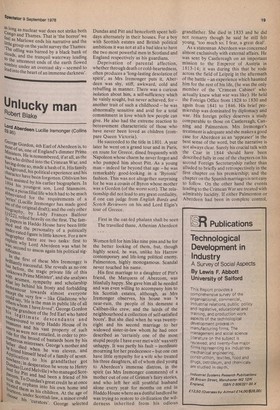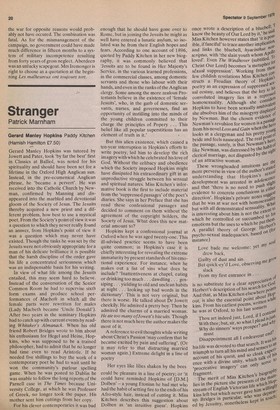Unlucky man
Robert Blake
Lord Aberdeen Lucille Iremonger (Collins E9.95) George Gordon, 4th Earl of Aberdeen is, to tnost of us, one of England's dimmer Prime Ministers. He is remembered, if at all, as the 'tan who drifted into the Crimean War, and having done so, made a hash of it. His family background, his political experience and his character have been forgotten. Oblivion has be, en assisted by his earlier biographers. In '894 his youngest son, Lord Stanmore, ‘;',rote a pious filial life which had to be much 4UbreV l . iated for the requirements of a ,series, (Lucille Iremonger has made good tb1Se of the original draft); and the only other (11°8raPhY, by Lady Frances Balfour 1 022), relied heavily on the first. The fam 137Papers in Haddo House have been little lised and the personality of a politically abn. der-rated figure is little known. For a new i°graPher there are two tasks: first to explain why Lord Aberdeen was what he as; second to assess again his political sig nificance, b !," the first of these Mrs Iremonger is krilliantly successful. She reveals as no one ", uas before, the tragic private life of this w.nknown Prime Minister', and she analyses 'ht acumen, sympathy and scholarship a ley behind his frosty and forbidding e,tneariour towards almost everyone co)ceePt the very few — like Gladstone who 4ers1d say, 'He is the man in public life of all w. whom I have loved'. George Gordon h i"! the grandson of the 3rd Earl who hated ervl legitimate descendants and 1,„,"eavoured to strip Haddo House of its 7 asures and his vast property of such vnets as were not entailed, in order to protiluue for the brood of bastards born by his f4,11111erous mistresses. George's mother and he' fel' died when he was eleven, and At, °,und himself head of a family of seven. 401LP.iieation to his grandfather got btiwnnere ; in desperation he wrote to Henry landdfas (Lord Melville) who managed Scotpa or Pitt and had been a friend of his 1 taciret.nks. To Dundas's great credit he at once tre:_(n. e orphans into his own home and fou;scd them as his children. At the age of chZeo, under Scottish law, a minor could ze his 'curators'. George selected Dundas and Pitt and henceforth spent holidays alternately in their houses. For a boy with Scottish estates and British political ambitions it was not at all a bad idea to have the two most powerful men in Scotland and England respectively as his guardians.
Deprivation of parental affection, whether through death or cold-heartedness, often produces a long-lasting desolation of spirit', as Mrs Iremonger puts it, Aberdeen was shy, stiff, awkward, cold and rebuffing in manner. There was a curious isolation about him, a self-sufficiency which he vainly sought, but never achieved, for — another trait of such a childhood — he was abnormally sensitive and avid for a total commitment in love which few people can give. He also had the extreme reaction to bereavement characteristic of those who have never been loved as children (compare Queen Victoria).
He succeeded to the title in 1801. A year later he went on a grand tour and in Paris, en route for Greece, dined frequently with Napoleon whose charm he never forgot and who pumped him about Pitt. As a young man — indeed far beyond that age — he was remarkably good-looking in a 'Byronic' fashion. This was not altogether surprising for he was a cousin of Byron whose mother was a Gordon (of the worst sort). The relationship did not lead to any great cordiality, if one can judge from English Bards and Scotch Reviewers on his and Lord Elgin's tour of Greece.
First in the oat-fed phalanx shall be seen The travelled thane, Athenian Aberdeen . .
Women fell for him like nine pins and he for the better looking of them, but, though highly sexed, he was, unlike his Harrow contemporary and life-long political enemy. Palmerston, highly monogamous. Scandal never touched his name.
His first marriage to a daughter of Pitt's friend, the Marquess of Abereom, was blissfully happy. She gave him all he needed and was even willing to accompany him to his Scottish estates, although, as Mrs Iremonger observes, his house was 'a near-ruin, the people of his demesne a Caliban-like crew, and the lairds of the neighbourhood a collection of self-satisfied boors'. But she died when he was twentyeight and his second marriage to her widowed sister-in-law whom he had once described as 'certainly one of the most stupid people I have ever met with' was very unhappy. It was partly his fault — inordinate mourning for her predecessor — but one can have little sympathy for a wife who treated his three daughters, all of whom died young to Aberdeen's immense distress, in the spirit (as Mrs Iremonger comments) of a mother out of one of Grimm's fairy stories, and who left her still youthful husband alone every yeat for months on end in Haddo House where as a dutiful landlord he was trying to restore to civilization the.wilderness inherited from his odious grandfather. She died in 1833 and he did not remarry though he said he still felt young, 'too much so, I fear, a great deal'.
As a statesman Aberdeen was concerned almost exclusively with external affairs. He was sent by Castlereagh on an important mission to the Emperor of Austria in 1813-14; it was during this that he rode across the field of Leipzig in the aftermath of the battle — an experience which haunted him for the rest of his life, (he was the only member of the 'Crimean Cabinet' who actually knew what war was like). He held the Foreign Office from 1828 to 1830 and again from 1841 to 1846. His brief premiership was dominated by diplomacy and war. His foreign policy deserves a study comparable to those on Castlereagh, Canning and Palmerston. Mrs Iremonger's treatment is adequate and she makes a good case for Aberdeen as an 'appeaser' in the best sense of the word, but the narrative is not always clear. Surely his crucial talk with the Czar in 1844 should have been described fully in one of the chapters on his second Foreign Secretaryship rather than alluded to briefly and retrospectively in the first chapter on his premiership; and the chapter on the Spanish marriages is not easy to follow. On the other hand the events leading to the Crimean War are treated with admirably lucidity. If either Palmerston or Aberdeen had been in complete control, the war for opposite reasons would probably not have occured. The combination was fatal. As for the mismanagement of the campaign, no government could have made much difference in fifteen months to a system of military incompetence resulting from forty years of gross neglect. Aberdeen was an unlucky scapegoat. Mrs Iremonger is right to choose as a quotation at the beginning Les malheureux ont toujours tort.



































 Previous page
Previous page